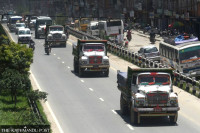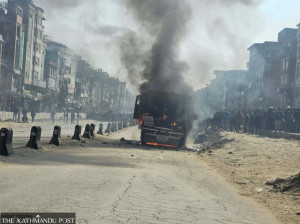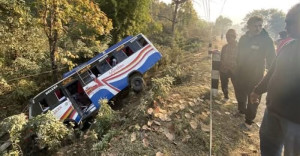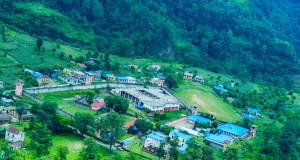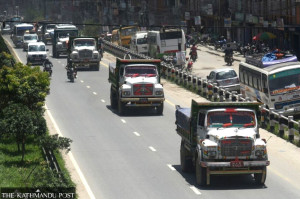Bagmati Province
Thamis face maternal health issues due to early marriages
In Thamichagu village of around 400 Thami households, children are encouraged to find a partner as soon as they hit puberty.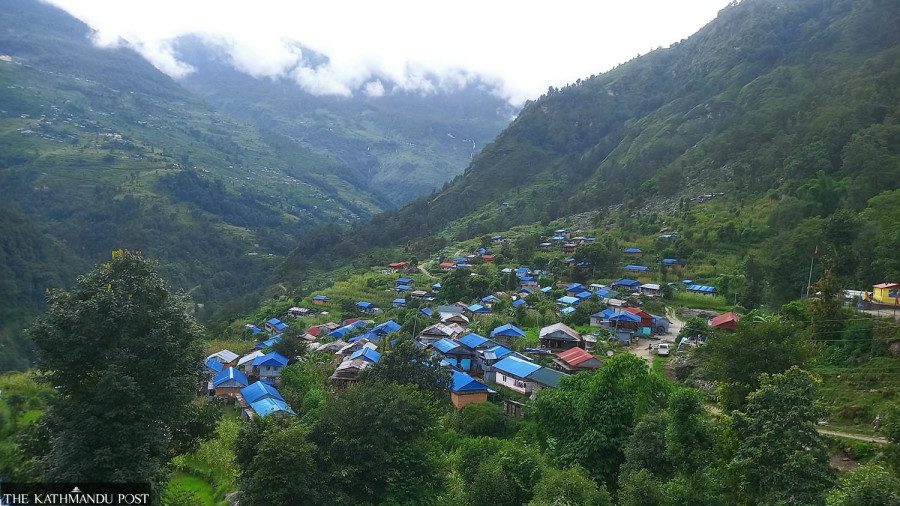
Kedar Shiwakoti
A 17-year-old girl named Uri Thami, whose name has been changed for privacy reasons, from Thamichagu in ward 8 of Bigu Rural Municipality eloped at the age of 14 in February 2022. She was a grade nine student when she dropped out.
Her husband died by suicide three months after they got married leaving behind his young pregnant wife. The teenager gave birth to a baby boy in February 2023.
According to Thami, the couple eloped to get married with the permission of their families. The husband's family gave them a piece of land and some cattle to live off but that was not enough for the couple to survive on.
“My husband killed himself. He was stressed with financial worry since we didn’t have any other source of income,” said Uri. “I am in no place to raise a child and work alongside to make money. Marrying early was a mistake that took a young boy’s life.”
Uri has moved to her maternal house since her husband’s death. She says it was easy for her to move back in with her parents since she had eloped with her husband with their permission.
“In my community, the parents encourage the children to get married at a very early age. They say it is a part of our tradition,” said Uri. “Since the parents themselves insist on early marriage, the children see nothing wrong in it. I thought I was doing the right thing when I eloped, but now I regret taking such a huge life decision on a whim.”
Child marriage is still widely prevalent in the Thami community and its adverse effect on the lives of the children and their mental health is not debated, in fact, the children are encouraged to find a partner as soon as they hit puberty.
Earlier, parents would arrange for their children to be married off before they reached the age of 12. While these days parents wait until their children reach adolescence before marrying them off, the damage the tradition has had on young girls and boys from the Thami community is irreversible.
According to Nepal’s Civil Code, the minimum age for marriage for both women and men is 20. As per Article 173 of the Criminal Code, a person found guilty of either committing or arranging a child marriage is subject to a jail term of up to three years and a fine of Rs30,000.
However, the Thami community still practices child marriage citing their traditions.
According to Bigu Rural Municipality, there are more than 400 houses in Thamichagu village. The entire population of the village comprises the Thami community, which is one of the 59 indigenous communities recognised by the existing laws of Nepal. The National Census 2021 puts their total number at 32,743.
Hira Thami, ward chair of Bigu-8, says despite repeated efforts, the rural municipality has not been able to control child marriage in the village.
“The rural municipality conducts awareness campaigns to inform the villagers that child marriage and early pregnancy are harmful to the children and that the practice itself is unlawful in Nepal,” said Hira. “But the villagers continue this practice. No one files a police complaint so even the police can’t take legal actions.”
According to Devika Thami, deputy chair of the rural municipality, since they could not control child marriages and early pregnancies in the village, the rural municipality has started a birthing centre at the Khopachagu Health Post.
Dinesh Budhathoki, auxiliary health worker at the Khopachagu Health Post, said that 40 to 45 teenage girls give birth at the birthing facility annually. “The families of pregnant teenagers usually lie about their age. But we can tell when it’s a teen pregnancy due to the complications they face during delivery,” said Budhathoki.
Yunisa Thami (name changed) is a 17-year-old girl from Thamichagu. She eloped last year in December and is currently pregnant. A few months after they eloped, her husband left for foreign employment to support his family back home.
“My husband had to leave to earn money for us. Without him, it is getting difficult for me to take care of myself,” said Yunisa. “Nobody can understand how much I regret getting pregnant at this age. I’m always sick but there is no one here to help me. We had to live separately after marriage because that’s the tradition in our culture.”
Yunisa says that the number of women in the village who became mothers by the time they turned 16 is very high and with the risks of underage pregnancy she now fears for her health.
“Now that I am pregnant and have been hearing about health risks, I am scared. Facing this pregnancy alone scares me more,” said Yunisa. “Two years ago, a pregnant teenager from the village died of excessive bleeding during childbirth.”




 9.89°C Kathmandu
9.89°C Kathmandu
